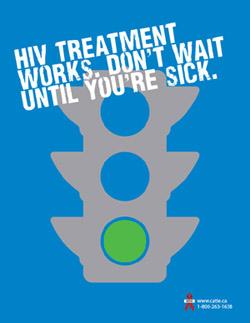A new campaign is trying to get HIV-positive people living on the street to begin treatment.
The campaign — created by the Toronto-based Canadian AIDS Treatment Information Exchange (CATIE) — will provide posters and postcards to AIDS service organizations (ASOs) and HIV clinics across the country. The material seeks to dispel some of the myths around HIV treatment.
The three postcards are headed: Treating HIV might not be as hard as you think; HIV treatment works. Don’t wait until you’re sick; and HIV treatment only works if you take it every day. Each of the postcards contains simply worded information on that particular subject.
“It’s particularly targeted at people who are living on the street and/or have low literacy,” says Laurie Edmiston, CATIE’s executive director. “It’s not easy to take important treatment information and get it to people who can’t read. If they see a simple message they might go to their doctor.”
Edmiston says the campaign was inspired in part by her visit two years ago to the Cool Aid Community Health Centre in Victoria, BC.
“Chris Fraser [a doctor at the clinic] told me he had 400 clients with HIV and half were not on treatment because they were worried about toxicity and that their chaotic street life could not handle the regimen,” she says.
“He said, ‘Give me some simple messages, some simple postcards, that can help me convince these people.’ People are dying not ever having been on treatment.”
Edmiston says it’s a myth that people living on the street can’t handle the demands of an HIV-medication regime.
“People who are addicted have a schedule around their addiction,” she says. “They’re already managing things like homelessness and poverty that I can’t imagine. People who are working with street populations aren’t giving up on them.”
Edmiston says the issue is not confined to street populations. Even educated people can believe that they’re okay unless they actually develop AIDS.
“I know middle-class, educated people who are delaying going on treatment,” she says. “HIV is harming your body in ways you can’t see or feel. It really is just in the last few years that information on the toll that HIV takes on your body on its own has emerged.”
Edmiston says the campaign materials will be available to ASOs and HIV clinics for free through CATIE’s online order centre at Catie.ca. She says the campaign will also be trying to reach other venues.
“We’ll be looking at community health clinics, youth centres, aboriginal drop-in centres,” she says. “We’ll be trying to catch people who aren’t necessarily acknowledging they’re HIV-positive.”
The campaign is a pilot project that will be reexamined in about a year, says Edmiston.
“That’ll be the next stage,” she says. “We don’t know whether it will be targeted more specifically in terms of audience.”


 Why you can trust Xtra
Why you can trust Xtra


